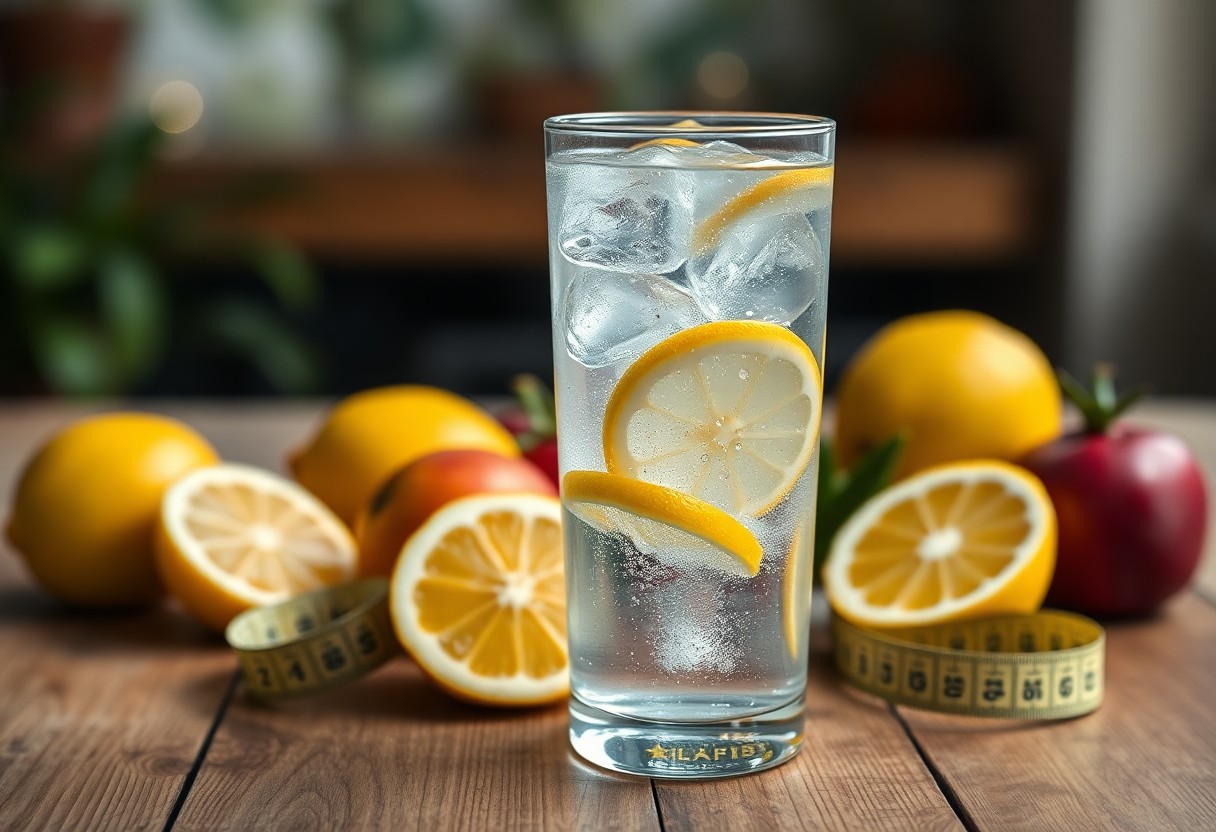Most people seeking to lose weight often wonder about the role of beverages in their diet, and sparkling water may catch your attention. New research suggests that carbonated water can enhance glucose uptake and promote a feeling of fullness, potentially supporting your weight loss efforts. However, its impact is modest and should be viewed as part of a broader strategy that includes healthy eating and regular physical activity. Understanding how sparkling water fits into your overall diet can empower you on your journey toward better well-being and weight management.
The Science Behind Sparkling Water and Weight Loss
For those exploring weight loss strategies, understanding the science behind sparkling water is important. Recent research indicates that carbonated water may slightly enhance glucose uptake in cells, which could contribute to lower blood sugar levels. While these effects are modest, swapping sugary beverages for sparkling water can be a practical step in your overall weight loss journey.
Metabolism and Blood Sugar Regulation
The intake of carbonated water has been linked to a small boost in metabolism. Studies show that when carbon dioxide from sparkling water enters your bloodstream, it alters blood pH levels, which can enhance glucose absorption by cells. This temporary reduction in blood sugar levels supports your body’s metabolic processes, but it should not be viewed as a standalone solution for weight loss.
Effects on Appetite and Satiety
Between the carbonation and the physiological changes it prompts, there is potential for sparkling water to influence your appetite and sense of fullness. The bubbles create a feeling of distension in your stomach, which can lead to decreased hunger and smaller portion sizes at meals. This could be particularly beneficial if you are looking to manage your calorie intake.
Indeed, many individuals report experiencing increased satiety after consuming sparkling water, making it easier to avoid unnecessary snacking. Incorporating fizzy water into your routine can amplify your efforts to eat less, especially when you replace high-calorie, sugary drinks. Keep in mind, your overall dietary pattern and lifestyle choices will play a significant role in achieving your weight loss goals, so consider sparkling water as a helpful addition rather than a sole solution.

Comparative Benefits of Sparkling Water
If you’re looking to enhance your weight loss efforts, understanding the comparative benefits of sparkling water can be helpful. Below is a table outlining key advantages of incorporating sparkling water into your diet compared to sugary drinks:
Benefits of Sparkling Water vs. Sugary Beverages
| Sparkling Water | Sugary Beverages |
| Low or no calories | High in calories |
| Can increase feelings of fullness | May lead to overeating |
| No added sugars | High sugar content |
| Hydrating alternative | Dehydrating effect |
Replacing Sugary Beverages
At the core of weight loss strategies is the need to cut down on sugary beverages that contribute excess calories. By replacing these drinks with sparkling water, you can significantly reduce your daily caloric intake while still enjoying a refreshing experience.
Impact on Caloric Intake
By incorporating sparkling water into your meals, you can enhance your overall hydration and potentially manage your caloric intake more effectively. Research indicates that sparkling water can promote satiety due to the carbonation, helping you consume smaller portions or avoid snacking.
Further, substituting sugary drinks with sparkling water not only reduces your calorie consumption but also helps stabilize your blood sugar levels. As you replace high-calorie beverages with carbonated water, you may find it easier to stay within your daily calorie goals, ultimately supporting your weight loss journey.
Hormonal Responses to Sparkling Water
Assuming you opt for sparkling water as part of your weight loss strategy, it’s vital to understand its potential impact on hormonal responses. Research suggests that the carbonation in sparkling water can influence processes in your body that are vital to managing weight. While some studies indicate minimal glucose reduction, the relationship between carbonated beverages and hormones like ghrelin and its effects on hunger remains more complex.
The Role of Ghrelin
Across various studies, ghrelin has been identified as a key hormone that signals hunger to your brain. Some research points out that drinking sparkling water may elevate ghrelin levels, which could paradoxically increase your appetite. This conflicting evidence highlights the necessity of considering your overall dietary habits and how they interact with hormonal balance.
Potential Effects on Hunger
Below the surface, the carbonation in sparkling water may elicit feelings of fullness or bloating that can help reduce calorie intake. While the sensation of fullness can curtail snacking, the increased ghrelin levels could complicate this. Achieving balance is vital; you might find sparkling water beneficial, but how it interacts with your hunger cues can vary greatly among individuals.
Hormonal responses play a vital role in weight management, and the interplay between hunger and satiety will influence your dietary choices. While sparkling water can increase feelings of fullness for some, the elevation of ghrelin might prompt others to eat more. By understanding these potential effects, you can tailor your approach to weight loss, ensuring that you create lasting health changes that fit your lifestyle.
Practical Recommendations for Weight Loss
Once again, it’s vital to incorporate realistic strategies into your weight loss journey. Opting for sparkling water as a replacement for sugary beverages can help you cut calories while still satisfying your thirst. You should also focus on portion control and aim for a balanced diet that supports your overall well-being and weight loss goals.
Incorporating Sparkling Water into Your Diet
Any time you choose sparkling water, try to pair it with meals to help with portion control and increase your satiety. You may find that the carbonation creates a satisfying sensation of fullness, which can assist you in reducing overall calorie intake.
Complementary Weight Loss Strategies
Around the consumption of sparkling water, it’s beneficial to engage in complementary weight loss strategies. These can include increasing your intake of fruits, vegetables, and fibers, along with regular physical activity, to enhance your overall results.
Indeed, combining sparkling water with a holistic approach to weight loss can amplify your results. Incorporate higher-protein foods and increase your daily physical activity to boost calorie burn. Setting a goal to eat more nutrient-dense foods while staying hydrated can significantly impact your journey. Consider making incremental changes, such as replacing high-calorie beverages and snacks, to foster sustainable habits that lead to long-term success in managing your weight and promoting your overall health.

Potential Drawbacks and Considerations
Not everyone may find sparkling water beneficial for weight loss. The carbonation in these drinks can lead to increased levels of the hunger hormone ghrelin, which may potentially heighten your appetite. Furthermore, the effects of sparkling water on metabolism are minimal, meaning it should not be relied upon as a standalone strategy for losing weight.
Individual Responses to Carbonation
To understand the effects of sparkling water on your weight loss journey, it’s necessary to recognize that individual responses to carbonation can vary. Some people may experience a satiety boost that aids in portion control, while others could find that carbonation triggers unwanted hunger or cravings. This variability can influence the overall effectiveness of sparkling water in your diet.
Bloating and Discomfort
With the intake of sparkling water, you may experience bloating or discomfort, particularly if you are sensitive to carbonation. While many individuals report feeling fuller after consuming carbonated drinks, this sensation can also lead to temporary stomach distention that some may find unpleasant.
Indeed, bloating or discomfort associated with carbonated drinks can be a concern for many. If you find that sparkling water leaves you feeling excessively gassy or uncomfortable, it may not be the right choice for you. Additionally, individuals with gastrointestinal issues or a tendency to experience bloating should approach sparkling water cautiously. It’s vital to listen to your body and, if necessary, opt for still water or other low-calorie beverages to achieve a feeling of fullness without discomfort.
Summary of Findings
Many studies suggest that drinking sparkling water may have minor benefits for your weight loss efforts. Research indicates that carbonated water can slightly increase glucose uptake in cells and create a feeling of fullness, potentially leading to smaller portion sizes. However, these effects are small and should be part of a broader strategy that includes replacing sugary beverages with fizzy water. It’s important to focus on your overall dietary habits and lifestyle choices to achieve sustainable weight loss while considering how sparkling water might fit into your routine.
Final Words
The evidence suggests that while drinking sparkling water may offer some benefits for weight loss, such as increased satiety and slightly improved glucose uptake, its effects are relatively modest. To make the most of your weight loss efforts, consider replacing sugary beverages with sparkling water as part of a comprehensive approach that includes a balanced diet and regular exercise. Ultimately, focusing on your overall dietary patterns and lifestyle choices is key to achieving and maintaining your weight loss goals while promoting better health.


